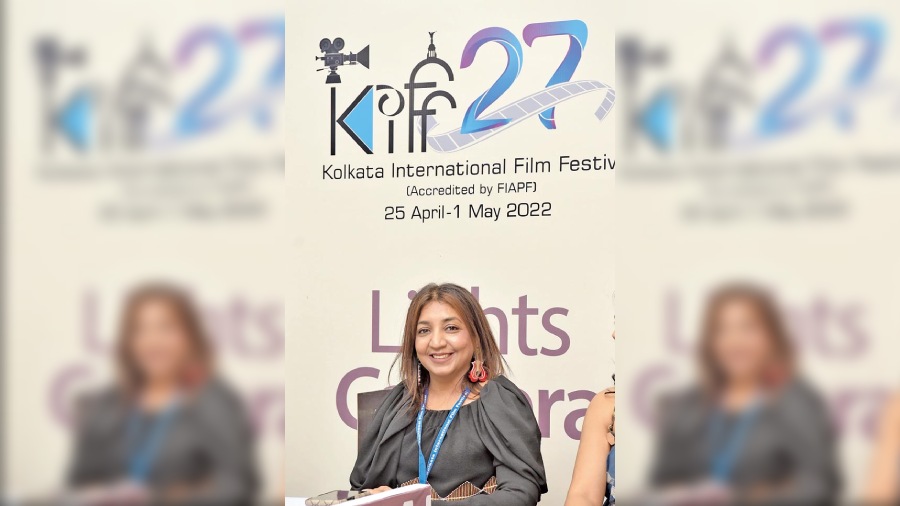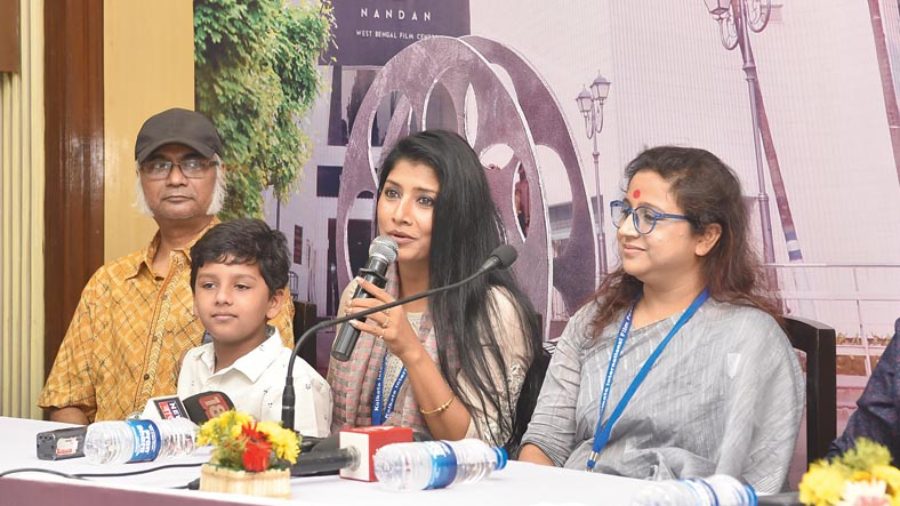The Green Window, directed by Indira Dhar Mukkherjee and presented by Priti Agarwal, tells the story of Georgy, inspired by the tragic real-life story of an old-age home resident named Georgetta Lorimer, abandoned by her family during her zenith days. The protagonist is played by Jaya Seal Ghosh on screen, who also co-produced the film. The film mirrors the social reality of our times. It was recently screened and nominated in the National Competition and India Premiere at KIFF, and also won the 12th Dada Saheb Phalke Special Jury Award in the best film category apart from many other national and international awards. The Telegraph talks to the director to decode the film’s journey from its making to doing the rounds at various festivals...
What kind of reception is The Green Window getting at film festivals?
It is overwhelming. People don’t get to see a lot of classics these days. At KIFF people started clapping as soon as the screening was over. We are already 10 laurels down nationally and internationally.
The book (The Angels on Earth) from which the story is adapted on screen is written by you. What was the genesis of the story and what inspired you to tell this story?
I have known Georgetta all my life. She was staying at St. Catherine’s old-age home. She was waiting for her family to come back. They did not come back in real life but in reel life, I took the creative freedom to give it a happy ending where her family comes back.
Have you ever had a chance to personally interact with her? What were those interactions like?
Till 2011, she was alive and I met her. Throughout my school days we met her as she used to love kids and she would call us through her green window after school hours. She saw her grandchildren in us and interacted with us through the window. I knew her until her last days because I was in touch with her.
For how long did you live with the story?
From the age of seven to 34 or 35.I wrote this story when I was carrying my child in my womb and directed it when he was six-and-a-half months old. This story is not just about Georgetta, it is about the elderly ladies of any old-age home. After living in a house for several years then to live outside is never easy. It was shot in a real location. I took Jayadi to the home and church for her to interact with them.
What made you take the script to Jaya Seal Ghosh for playing the protagonist?
Jayadi is someone who is not overexposed. She is a brilliant actress. After seven to eight years she is acting again. I think personality-wise she is very strong. Georgetta was also very strong. That is why I chose her to play the role. Georgetta Lorimer was a Tamil Christian and Jayadi is from Assam, so it was easy for her to grasp the dialect.

I loved the script and I believe in angels. This is a story that talks about angels on earth. When Jayadi told me,I agreed immediately. In our film there is a special thing that we are all women. They wanted a female producer. The story is very positive. It was my debut as a producer. I was always in the loop regarding the look of the film. If something substantial comes, I would want to produce a different kind of story or subject again. I am more interested in women-oriented films. I am not a confused person, I am a prompt decision maker. If I hear a story and it clicks in my mind, I go for it — Priti Agarwal, who presented and co-produced the film.
The child artistes in your film performed brilliantly. What was your experience of directing them?
The preparation is very important for any film. For them it was their first film. I did intense workshops with them and took them through the basic school of acting. I took them to the locations. Both Zion and Aarav did not need a single re-take. They were very prepared and I am very happy with their performance.
The film was shot at a real location. What were the challenges and how did it add to the film’s look and feel?
It was the first time a film was shot in the premises of St. Catherine’s Home. When a film is shot in a place where the character stayed, it carries a lot of authenticity to the film. The look and feel completely transformed. The look of the film that we had, I am sure it could never be created, it would have looked a bit artificial. I was very clear.The pace of the film or the movement of the film was very different from other films. The Green Window has a classic touch to it. The treatment of the film was very important. I can’t make a film look like 2022, when it is a story from the 1990s. That won’t do justice to the film.
You wrote the story for the book and then adapted it on screen. Isn’t there a chance of creative monotony when you are adapting your own literary writing? What are your thoughts on it?
When we write a story or book, we tell the story more elaborately. I am a writer first and then I am a director. When it is about a book, we can read the nitty-gritties but when it is a film, I am time-bound. I tried to keep only the important things. I took certain fragments of the story.
What kind of films inspire the filmmaker in you?
I like biopics. My film, Soch, premiered recently at Nandan. We got a very good response. Soch talks about pursuing your passion. No one should give up on their passion. For me, I like films that have a social message to give. A strong message for society. To do something good. The Green Window is about taking care of elderly people. You can’t just leave them to take care of themselves and just move somewhere. I like realistic films and I like biopics.
Making a transition to a career in films from the corporate world, you are making one film after the other. How difficult or easy was this transition for you and what’s next in the pipeline?
I am very happy that I am living my dream. I am very happy that I am able to make films. I never thought that I have crossed 32, I have spent eight to nine years in corporate, I have a stable career, why should I move to films. I always wanted to make films. Of course, the transition wasn’t easy. But I think I took the right decision. My films are being well-appreciated. I am coming up with my first Bangla comedy film and just finished the shoot of my feature film. I am very grateful to Priti and Jaya Seal Ghosh. Both of them allowed me to make the film, the way I wanted to. I had done only one film. Mulaqat with Farrukh Jaffar in Mumbai. I am really happy that they are liking my scripts and liking the stories I am telling.
Pictures: B. Halder
